Key takeaways:
- Ethical breaches can undermine trust within organizations and are often a result of prioritizing results over integrity.
- Corruption in research includes data manipulation, plagiarism, and conflicts of interest, which damage credibility and public trust.
- Establishing a clear code of ethics and fostering open dialogues about ethical dilemmas are essential in preventing unethical behavior.
- Future integrity in research will rely on collaboration across disciplines and the use of technology to enhance transparency and accountability.
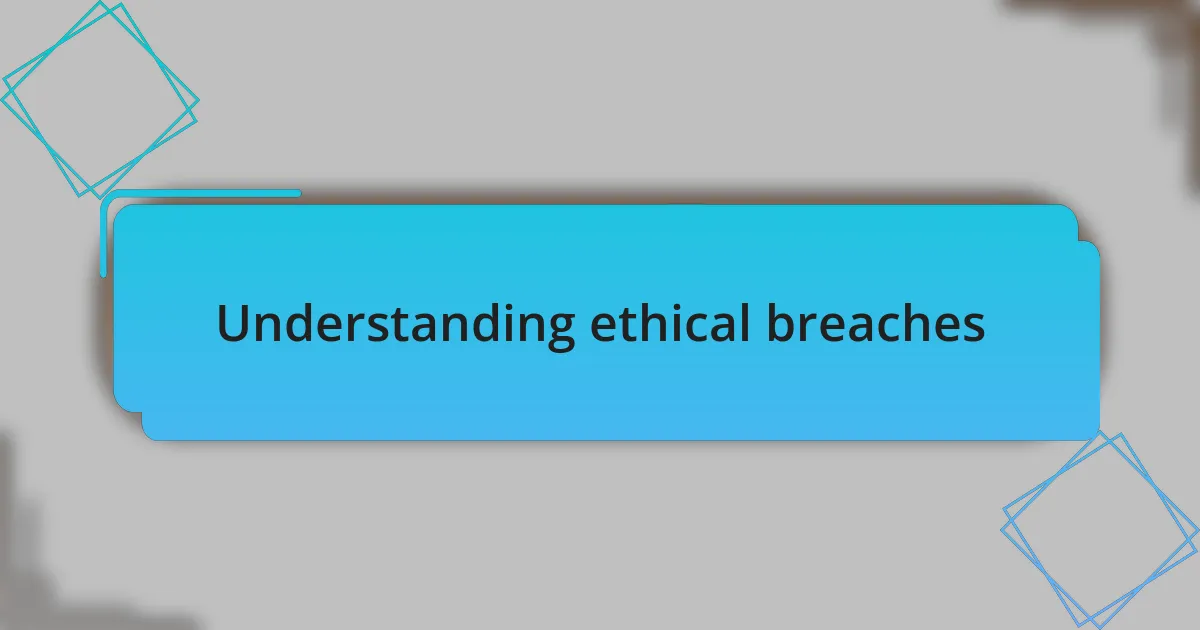
Understanding ethical breaches
Ethical breaches occur when actions violate moral principles or standards we commonly accept. I remember attending a seminar where a guest speaker highlighted his experience with a colleague who misrepresented research findings. Hearing firsthand how that affected trust within his team really struck me—ethical breaches are not just abstract concepts; they have real-world implications.
Think about it: have you ever witnessed a situation where someone chose convenience over integrity? It’s easier to overlook minor ethical lapses, but those small choices can snowball into significant breaches, eroding the fabric of trust in organizations. From my perspective, even a seemingly insignificant compromise can lead to a culture where questionable decisions become the norm.
Additionally, ethical breaches often stem from a disconnect between policy and practice. I recall a case at my workplace where the company’s code of ethics was clear, but day-to-day operations didn’t align with those standards. It left many employees questioning their commitment to honesty and transparency. This dissonance not only diminishes individual morale but also undermines the organization’s credibility in the long run.
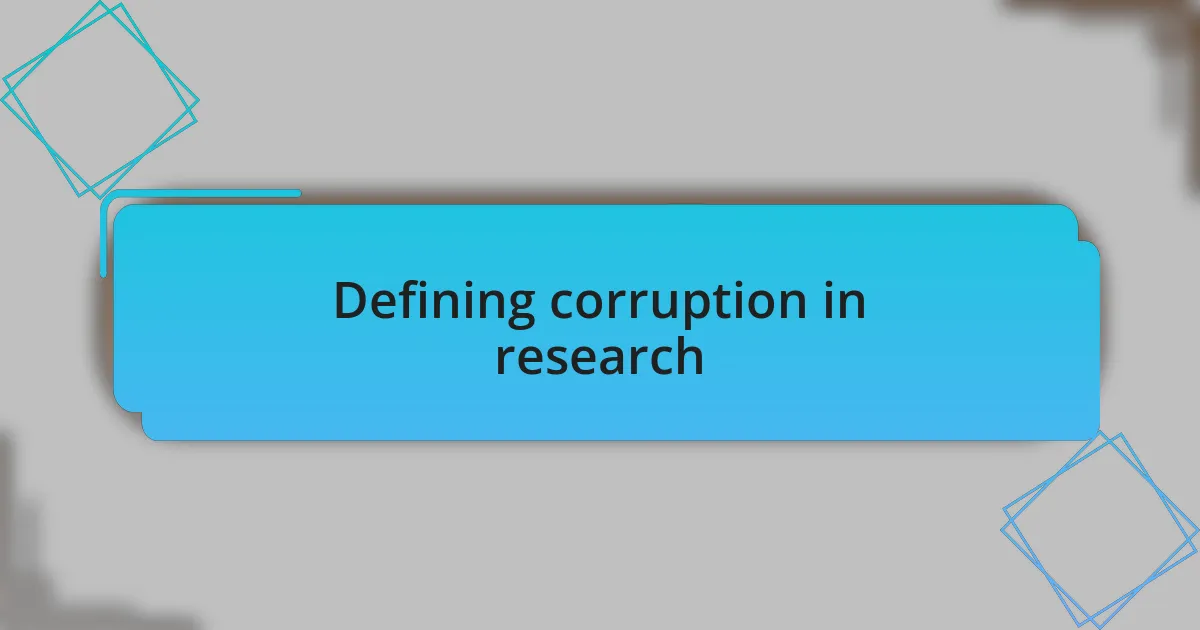
Defining corruption in research
Corruption in research can be defined as the intentional manipulation or misrepresentation of data to achieve personal or institutional gain. I once witnessed a situation where a researcher altered their experimental results. It was shocking to see someone compromise their integrity, not just jeopardizing their career but potentially harming public trust in scientific inquiry.
Moreover, the scope of corruption extends beyond outright fraud; it can include practices like plagiarism or failing to disclose conflicts of interest. I remember a mentor of mine stressing the importance of transparency in research. He often shared his own experiences of navigating funding sources, emphasizing that failing to declare potential biases could skew results and damage credibility. How can we expect the public to trust our findings if we are not forthright about our sources?
In my own research journey, I learned that fostering a culture of ethical responsibility not only safeguards the integrity of our work but enhances collaboration within teams. Reflecting on my experiences, I’ve found that creating open discussions about ethical dilemmas encourages accountability. Aren’t we all better served when we tackle these issues head-on rather than sweeping them under the rug? This proactive approach not only preserves the validity of research but also nurtures a healthier environment for innovation.
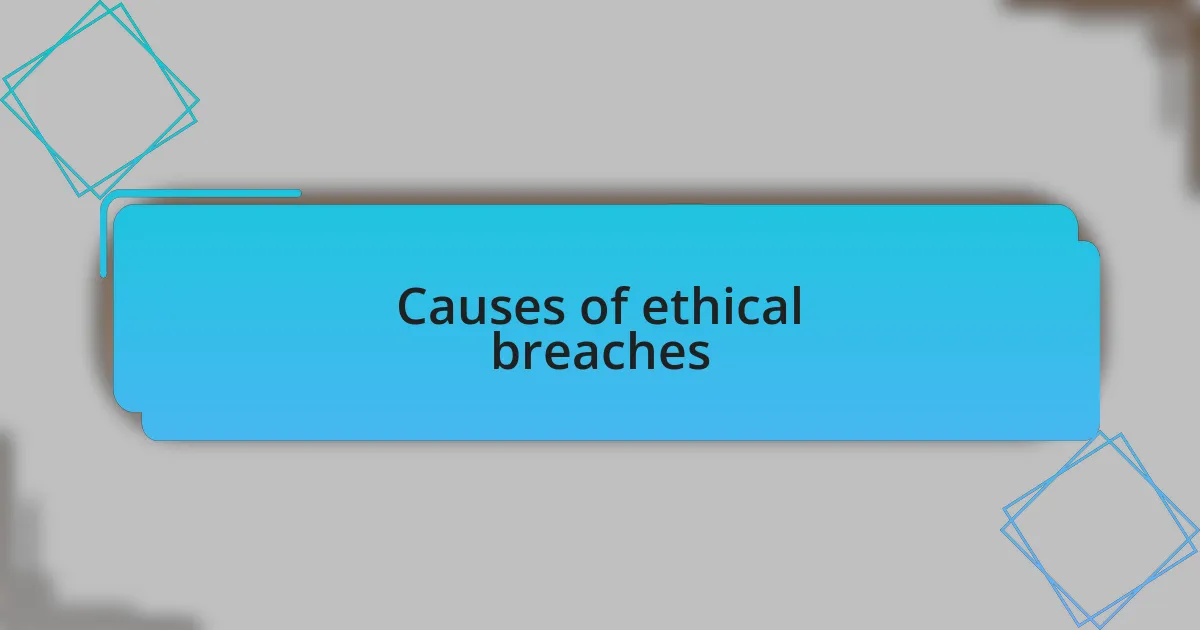
Causes of ethical breaches
Ethical breaches often stem from a culture that prioritizes results over integrity. I remember being part of a research team where the pressure to publish was overwhelming. The constant race to produce impactful findings can create an environment where short-cuts seem like the only option. How can researchers balance ambition with ethical responsibility when the stakes feel so high?
Additionally, a lack of proper training in ethical standards can contribute significantly to these breaches. In my early career, I encountered a colleague who genuinely didn’t understand the importance of data integrity. They believed that embellishing certain aspects of their findings was acceptable as long as they believed the outcome was beneficial. This made me reflect on how crucial it is to equip emerging scholars with solid ethical foundations—are we doing enough to prepare them for these challenges?
Lastly, conflicts of interest are prevalent and can cloud judgment. I once observed a researcher whose work was heavily funded by a corporation with a vested interest in the outcomes. It became evident that personal ambitions and financial incentives began to overshadow ethical considerations. This begs the question: how do we ensure that our passion for research doesn’t compromise our moral compass?
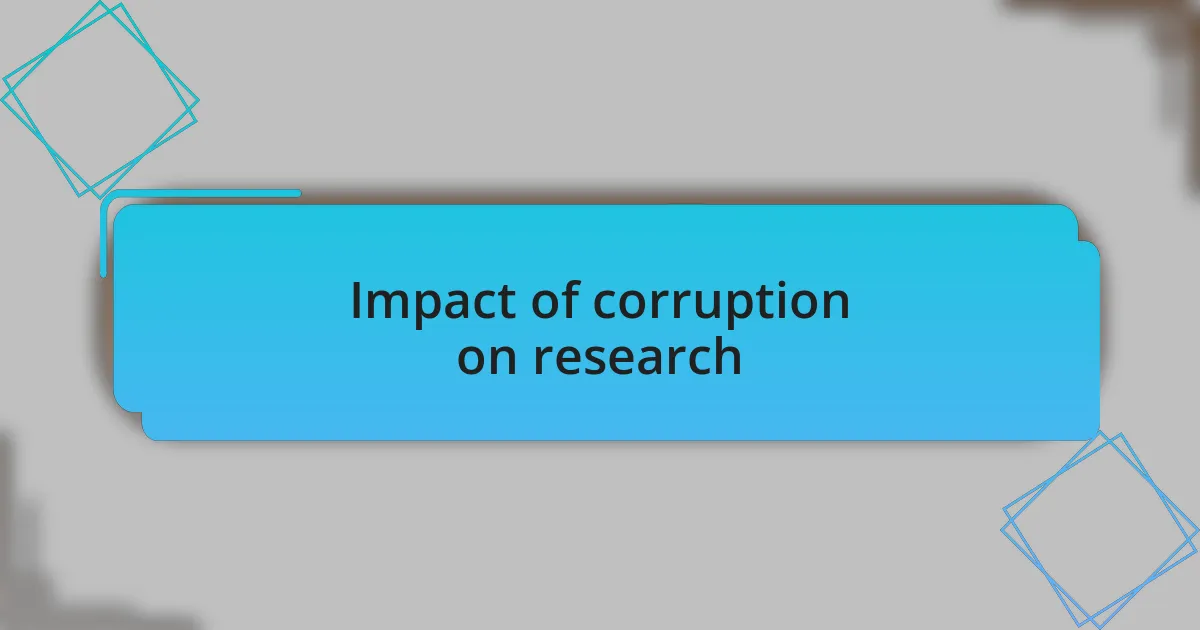
Impact of corruption on research
Corruption has a profound impact on the credibility of research. I recall a study that was widely touted for its groundbreaking results, only for it to be later revealed that certain data was fabricated. The fallout was immense, not just for the researchers involved, but for the entire field that had based further work on their findings. How can we trust in future studies when such breaches shake the very foundation of scientific integrity?
Moreover, the influence of corruption stretches beyond individual projects to taint the research community as a whole. I once attended a conference where prominent voices in our field openly questioned the legitimacy of peer-reviewed articles. The atmosphere was thick with skepticism, and it made me realize just how damaging a single act of corruption can be. If the public begins to doubt our findings, what does that say about our responsibility as researchers?
Ultimately, the impact of corruption on research can stifle innovation and progress. When ethical standards fall by the wayside, it can stymie the quest for truth. I have witnessed promising ideas being tabled because researchers feared their work would be overshadowed by scandals in the field. This leads me to wonder: how can we cultivate a research culture that champions ethical behavior, ensuring that integrity is always prioritized over dubious gains?
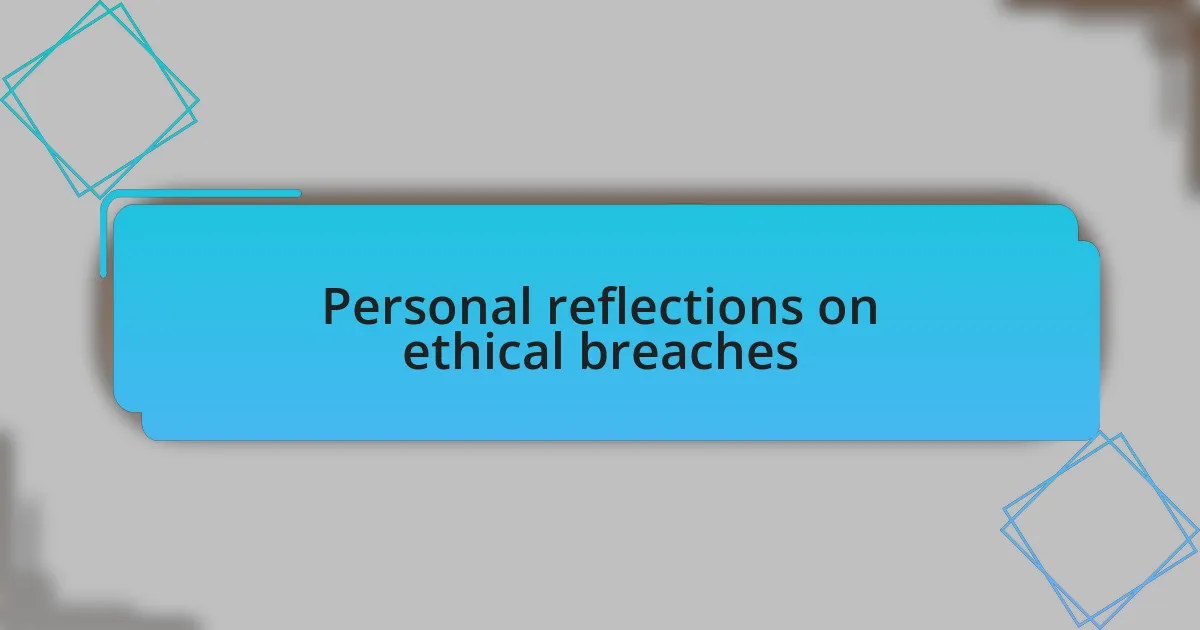
Personal reflections on ethical breaches
Ethical breaches are particularly disheartening because they erode trust among colleagues. I remember a time when a mentor of mine was accused of manipulating research data to secure funding. The shockwaves felt across our team were palpable. It left me wondering, how do we rebuild that trust once it’s shattered?
Reflecting on my own experiences, I can’t help but feel a mix of anger and sadness when I hear about unethical practices. In one instance, I was part of a collaborative project where one team member failed to disclose a conflict of interest. It hit hard when I realized that our collective efforts might have been compromised. It made me question whether the end justifies the means or if integrity should always be our guiding principle.
Each time I hear about an ethical breach, it sparks a fire in me to advocate for transparency and accountability. I once shared my concerns about research ethics during a panel discussion, where I urged my peers to consider the long-term repercussions of their actions. It’s clear to me that fostering a culture of openness is essential. Can we truly advance knowledge while turning a blind eye to dishonesty? The answer must be a resounding no.
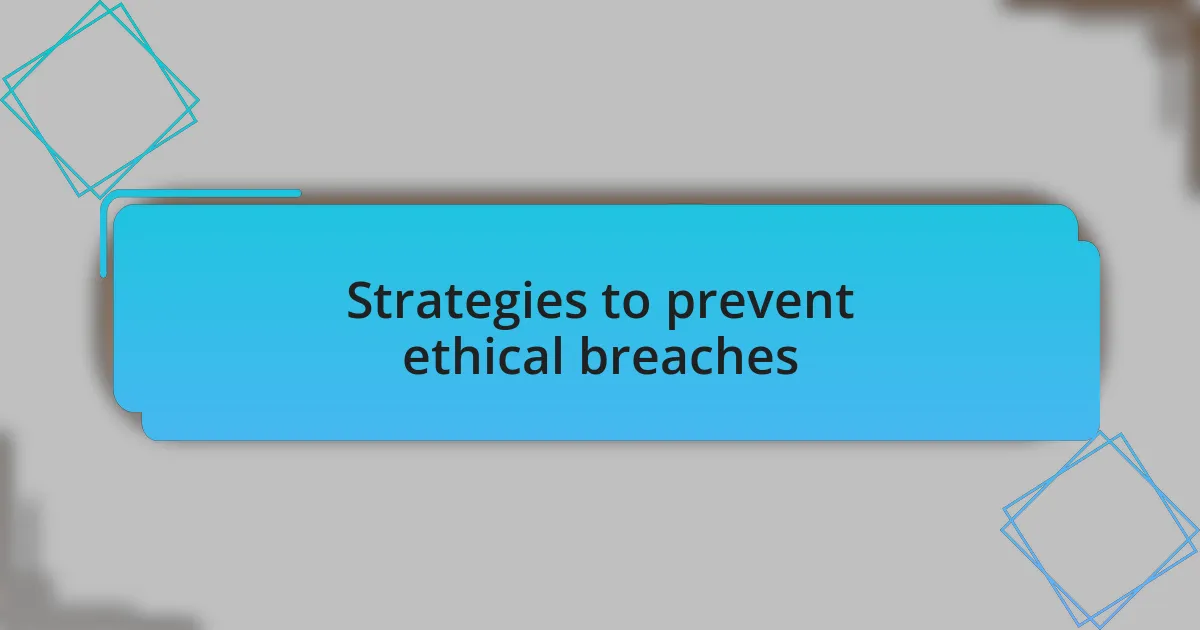
Strategies to prevent ethical breaches
Establishing a clear code of ethics can be a powerful first step in preventing breaches. While participating in a workshop, I witnessed firsthand how discussing scenarios that could arise in our field brought everyone’s attention to potential pitfalls. It was eye-opening; when we collectively acknowledged our responsibilities, it encouraged a sense of accountability that we desperately need.
Training programs that emphasize ethical decision-making also play a crucial role. I recall an intense seminar where we were placed in real-life ethical dilemmas and challenged to respond. The pressure was palpable, but those discussions helped me appreciate the importance of having tools to navigate complex situations. How can we expect to make the right choice if we haven’t practiced?
Encouraging an environment where open dialogues about ethics are welcomed can deter unethical behavior. Once, I initiated a casual lunch-and-learn session focused on discussing ethical dilemmas. It turned into a lively exchange that revealed so many different perspectives. Engaging in these conversations not only reinforces ethics as a priority but also builds a community that feels safe to voice concerns. Isn’t it vital that we create spaces where integrity can thrive?
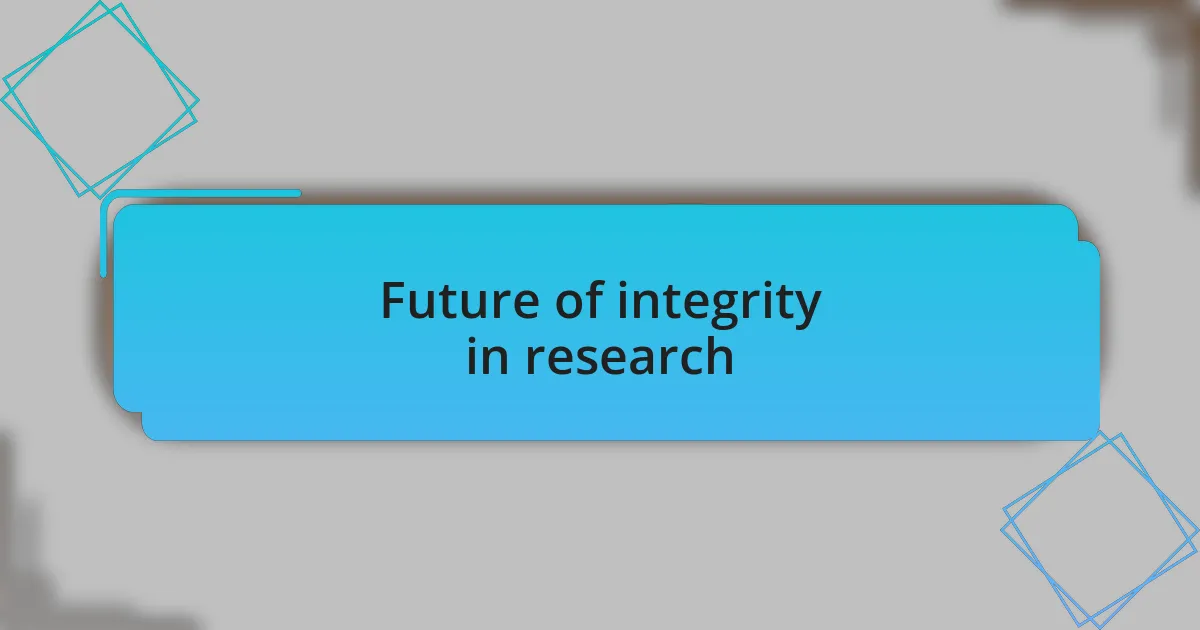
Future of integrity in research
As we look towards the future of integrity in research, I believe collaboration across disciplines will become increasingly vital. Recently, I was part of a multidisciplinary team project, and it struck me how diverse viewpoints helped us challenge assumptions and foster ethical standards. By working together, we can hold each other accountable, making it less likely for unethical practices to take root. Isn’t it fascinating how diversity in collaboration can bolster our commitment to integrity?
Moreover, technology is poised to play a crucial role in safeguarding research ethics. During a recent conference, I encountered several innovative tools designed to enhance transparency in data collection and sharing. These advancements not only encourage responsible conduct but also build public trust in our findings. How can we leverage these tools to uphold our ethical obligations more effectively?
Looking ahead, I sense that researchers will increasingly prioritize ethical considerations as part of their professional identity. I remember attending a panel discussion where seasoned researchers shared personal experiences that shaped their commitment to integrity. Their stories were moving and served as reminders that our choices, big or small, define the path of our careers. What legacy do we want to leave in our field?